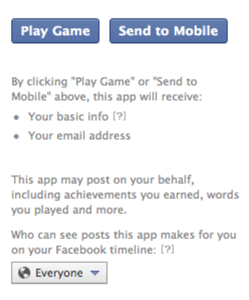
Facebook has changed the way it seeks permission to share users’ personal information with third-party apps and games, a move that could land the social network in a European court. A German consumer advocacy group is threatening to sue the social network unless it gives users a clear choice on whether they agree to share information.
Why Privacy Advocates Are Angry
What has provoked the Federation of German Consumer Organizations
is Facebook’s decision to drop the “Allow” and “Don’t Allow” buttons used in choosing whether to share personal information with a game or app. Rather than offer the choice in a no-nonsense permissions page, Facebook now shows in the App Center a page with colorful images and a single button that reads, “Play Game.” Under the button is the list in gray font, which could make it seem less important than text in bolder type.

Avi Charkham, co-founder of MyPermissions, lists five design elements on Facebook’s new page that he claims play down the fact that in choosing to play a game, people are giving up lots of information. To see exactly what’s being shared with the app developer, users have to roll over a question mark that then shows they are giving up their name, friends list, email, user ID, networks and “any other information you made public.”
Getting such information to advertisers is the core of Facebook’s business model – which naturally leads to pressure to push the envelope on privacy. “Facebook will push the concept of consent to the breaking point,” said David Jacobs, consumer protection fellow at the Electronic Privacy Information Center.
Has Facebook Crossed The U.S. Line?
To the Federation of German Consumer Organizations, Facebook crossed the line with its latest site change. In the U.S., though, that line is blurry. Under a recent Federal Trade Commission order, Facebook is required to first obtain “affirmative, express consent” from a user before sharing information with a third party. In addition, the company has to “clearly and prominently disclose” the information shared.
Facebook did not respond to a request for comment. Presumably, it believes that by agreeing to play a game, users are also agreeing to share personal data. Also, rolling over a question mark for details could technically satisfy the disclosure requirement. “Having the user click to use the app probably counts as affirmative consent,” Jacobs said. “But the App Center disclosures might not be clear and prominent.”
Pressure On Privacy Won’t Stop
Whether or not the recent changes meet U.S. or German requirements, it’s unlikely the company will stop looking for ways to mine the wealth of information it collects from provide. In a recent interview, Facebook engineer Andrew Bosworth, whose mission is to find ways to increase ad dollars from the company’s mobile app, said he is exploring ways to use a smartphone’s audio sensor to trigger relevant ads. For example, if you’re at a Bruce Springsteen concert, then you might be in the mood for buying the artist’s latest album.
The site is also investigating the money-making possibilities of sending ads based on a user’s place and time. “Maybe you’re walking past somewhere we know you’ll like and it tells you there’s a deal you can get,” Bosworth told Technology Review, published by the Massachusetts Institute of Technology. “Ads don’t have to be a distraction.”
Facebook’s Balancing Act
Like other Internet companies, Facebook is fishing for profits in the ocean of user information it gathers. But Facebook is unique in that it has to balance selling the information people think they are sharing only with friends while also respecting their privacy. That’s a high-wire act that’s likely to require constant adjustments to avoid a disastrous fall.





















